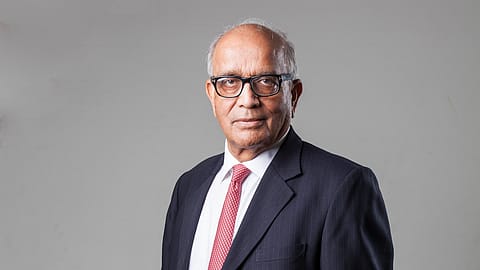Setting up a battery cell plant without control over raw materials is risky: R.C. Bhargava
Maruti Suzuki is planning on exporting 50,000 units of e-Vitara—which uses BYD batteries—during the current financial year to the United Kingdom first, followed by other European markets.

Maruti Suzuki India chairman R.C. Bhargava on Tuesday said that putting up a capital-intensive battery cell plant in India is a huge risk due to the unavailability of raw materials, which are controlled largely by China.
“The raw material is the problem... Especially if the raw material is controlled by one supplier, the risk is very high,” Bhargava told reporters in Hansalpur, Gujarat, on the sidelines of the rollout of e-Vitara, Maruti Suzuki’s first battery electric vehicle, for export markets.
“That is possibly one of the factors deterring people from making investments in battery manufacturing in India. How do I protect myself against some arbitrary decisions of the supplier?” asked the chairman of India’s biggest carmaker. “You can’t grow the mobility industry based on that kind of import dependence.”
The Japanese carmaker has been late to the EV race, while homegrown companies like Tata Motors and Mahindra & Mahindra have pulled ahead in EVs.
“Till now, everybody said that Maruti has missed the EV bus; we have just caught on to the EV bus,” said Bhargava.
EVs manufactured in Maruti Suzuki’s Gujarat plant will be exported to the United Kingdom first, followed by other markets in Europe. The company has yet to announce the India launch.
“We have to meet export orders. We should have enough production to meet domestic and international. If we start selling domestically, then we must have a certain minimum volume so that I can give a reasonable number of cars to all my dealers. We have a lot of dealer points,” said Bhargava.
Recommended Stories
Maruti Suzuki is aiming to export 50,000 EVs during the ongoing financial year.
The carmaker is using BYD batteries for its EVs. “There is a problem of making large volume EVs because of the batteries. If you import the batteries, it’s costly. If I am packaging the battery, I get a 15% advantage in customs duty. We are not even packaging batteries yet,” said Bhargava. “I would be hesitant to make a large commitment to the domestic market. That would mean importing batteries, which is very costly. So, I have to build some infrastructure first for localisation before we really talk of big volumes.”
Bhargava said the EV demand is picking up, but it is not going to grow at a very high rate. “It’s not grown anywhere in the world at a very high rate. So, India can’t be an exception to what’s happening in Europe and America,” he said.
Speaking on a favourable tax structure for hybrid vehicles, Bhargava said, “We can’t depend on one tech for reaching the net zero target. If you sell petrol and do not sell the cleaner cars, you are creating more pollution. 100% EV sales are not happening anywhere, even in China. So, for the remaining cars, you should sell cleaner cars rather than petrol and diesel cars. That’s the right solution. We believe there should be a differentiation (in taxation) based on fuel efficiency.”
(INR CR)
